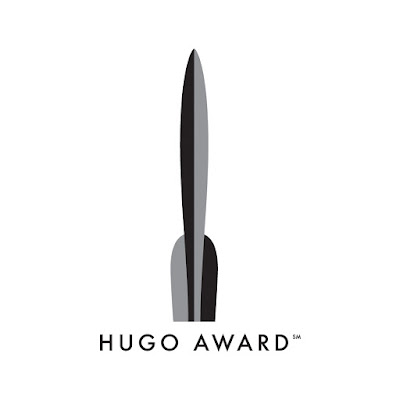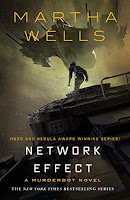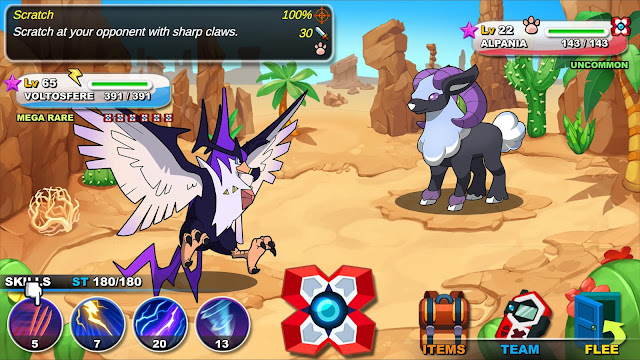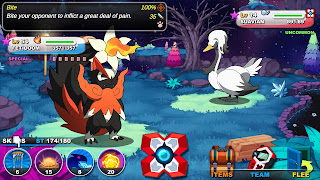Adri: Hello and welcome to this totally-not-late-at-all chat about what happened in the Hugo awards! One side effect of Hugos in December was that most of the post-Hugo excitement got overtaken by festive season celebrations, but late January feels like a reasonable time to look back on last month.
Joe: It has been an absolute whirlwind, it’s true. Typically we try to talk about the Hugo Awards right after the ceremony, but I was there in person and didn’t leave for a couple of days and then we went right into the holidays and now here we are!
The rocket shaped elephant in the room is that Nerds of a Feather won the Hugo Award for Best Fanzine! We won! It was (and remains) amazing! We’re not going to spend a lot of time talking about ourselves and our readers can find our acceptance speeches here.
For someone with a stutter and a previous (mostly gone) fear of public speaking, that crowd was definitely the largest I’ve had to speak in front of - though I couldn’t really see the audience what with the light and everything so mostly I was trying to make sure I didn’t tip over. The whole thing was a blur, to be honest. But the coolest thing, the absolute coolest thing was hearing the applause. They cheered. For us. It was amazing.
Adri: Your speech was great. I didn’t pay attention to all of it because I was also busy cheering at the small UK gathering we had (a good time was had by all, especially my dog!) but I enjoyed the replay. Several times.
Also, while the Hugo Awards don’t have a tradition of alternate universe speeches, they SHOULD, and Ira’s alternate universe speech for Lady Business is really beautiful and worth a read, and captures a very different tone over it’s like keeping a fanzine going during the relentless now.
On another note- and I’m sure we’ll talk about Related Work soon - I also got to experience losing a Hugo again, as well as the joy of getting the statistics and laughing and going “oh!”. CoNZealand Fringe came a comfortable 6th place in its category, against a solid ⅓ vote for No Award, and I can confirm that I’m just as proud of that endeavour as I was when we first put it together. It’s an honour to be nominated, bitches.
Joe: We didn’t get around to talking about Related Work when we had various Hugo category discussions - which is probably for the best because - as you said - you were a finalist in that category and it might have been a little bit awkward to discuss the other finalists without talking much about Fringe.
Related Work is such a weird catch-all category. Last year there were two conventions, a documentary, a personal non fiction work, and a translation of an epic poem - which makes it really hard to talk about.
I LOVE that ConZealand Fringe was a finalist and I am so happy that the work that you and the other organisers did in putting together an alternative to the actual ConZealand Worldcon that was deeply respectful of that Worldcon while working in the off hours when there was no programming in New Zealand time but allowed the virtual attendees (all of us) in the US and Europe to not completely jack our schedules. It was a super awesome thing and - as you noted by your 6th place finish - a fairly controversial one among a certain subset of fandom. For me - it was a wonderful experience that augmented ConZealand.
Maria Dahvana-Headley’s wonderful translation of Beowulf won the category and I’m not sure I was all that surprised. First - it was great. It is far more than what seemed like a gimmick at first (starting the poem with Bro) - but ultimately felt natural and right. I actually read parts of it out loud to check how the rhythms were working and holy hell did that work in the oral tradition.
Adri: I love Beowulf and I’m so delighted for Maria Dahvana Headley’s win. I’m also delighted that, while it wasn’t the year for events, a win for a translated epic poem reaffirms the investment in Best Related Work as a “grab bag” category, one which celebrates work that enriches the genre conversation in lots of different ways. By the way if the “BRW is for non fiction books” folks would like to propose a non fiction book Hugo category, I’d back that! But that’s evidently not what voters want to use this category for.
But let’s move on to some other categories!
Joe: Let’s!
Adri: I always enjoy running the comparison between my ballot and the eventual winners, and because I’m apparently a big old contrarian I usually have around 2-3 things that the electorate and I agree should be number 1. This year, I have 6! That’s still only 30% agreement between me and the hive mind, but I’ll take the improvement.
Joe: You know, I never actually check the count for how many winners I picked, but apparently it was 9 - which obviously means you should always listen to me except for all the times you shouldn’t.
Adri: Your brain is more jacked in to the pulse of genre, clearly.
Joe: My favorite thing about the Hugo Awards (besides actually winning, apparently) is the release of the nominations list. I love to see what almost made the ballot or if my favorites came close. For example - The Hugo, Girl podcast was two spots off the ballot and I really want to see them make it next year. Hugos There was a bit farther down in the top 15, but was within shouting distance.
It turns out that *you* were fairly close to being thrice a finalist last year with some solid nomination in Fan Writer (a category for which I will fall over if I ever see myself on the long list).
Adri: That was a delightful surprise! There were some great names on the fan writer long list this year, though I remain disappointed at some of the omissions (present company included but not really my focus here). I’m always super impressed by the genre critique of Stitch, who won last year’s Ignyte Award, and really wanted to see her on a fan writing ballot this year. But they and other excellent critics of colour are constantly being overlooked for the fan awards, and I think it highlights how far the genre community has to go in being genuinely inclusive: it’s not enough to have the same few authors of colour make the fiction categories every year if we’re not noticing excellence elsewhere too.
Joe: Stitch is on my nominating ballot this year. But, it does seem to be an issue the fan categories - they are very institutional and far fewer people nominate down the ballot, so there is so much more repetition in the finalists and even in the long lists. It’s so hard to break through - and that’s obviously on the nominators who are either not reading quite as widely in fan writing or not thinking about those names when it comes time to nominate.
Adri: On a more positive note regarding “institutionalised” categories: after five years of Uncanny Magazine dominating the Best Semiprozine Category, we saw a win from FIYAH Literary Magazine! The work that the FIYAH team do to publish, promote and build community around Black speculative fiction is extraordinary, and I’m so delighted to see them recognised (voters: do Strange Horizons next please). I also think that, as much as I enjoy Uncanny’s work, I don’t think their Hugo dominance reflects the state of fiction magazines in general: there are a lot of other really excellent publications, some of which aren’t eligible in this category on technicalities and some of which just haven’t hit people’s radars enough.
Joe: I don’t know if it came through on the stream, but the audience ROARED when FIYAH won (they were sitting in the row behind me, so I got extra surround sound)
Adri: As well they should.
We haven’t spoken much about the fiction winners yet, and given our conversations around the best novel and best series last year, we should probably talk about the thing we thought would happen that absolutely happened: Martha Wells’ Network Effect, and the Murderbot Diaries, taking both Best Novel and Best Series. On the one hand, it couldn’t have happened to a nicer Murderbot (and I’m very chuffed for Martha Wells as well). On the other hand, those were two really stacked categories and for the same thing to win both is a bit… well, it makes you look back and go “oh, well, OK then.” I like variety and chaos, what can I say.
Joe: Yeah - it’s so very well earned and deserved for Martha Wells. Her speech touches on some of the challenges of her career. Murderbot is great, I can’t argue with Murderbot - but at the same time it wasn’t my favorite in either category, which isn’t so much a criticism of Murderbot as it is an acknowledgment (as you say) of just how stacked the categories were.
I don’t know if I needed full chaos, but there was a sense of inevitability to the two Murderbot wins that wasn’t quite as exciting. Of course, if Jemisin had won her fourth Best Novel Hugo in as many novels, I don’t know what that would say either (and I had The City We Became at the top of my ballot).
Adri: I put Harrow first in the end, although it was a tough decision. And the thing is, for all the times during all the years of Hugos I’ve watched where I wanted something else to win more, I’m almost always cheering as loud as possible for the work that does win. There are a ton more deserving winners than there are rockets to give them, and an order of magnitude more works that deserve to be on a Hugo ballot but don’t make it for whatever reason. That’s why I fully sympathise with people who keep away from awards and best-of culture entirely, because there’s definitely something to be said about who gets this very limited resource and what it really means. But also, I like awards, and I love the Hugos, and that would be the case even if I wasn’t about to get a rocket for the mantlepiece (right now, I have a placeholder in the form of a silver water bottle, which I might just keep on display even after the real one arrives).
Joe: There’s an entirely separate conversation to be had about the meaning of awards and the recognition of excellence, and I’m not sure if I have anything new to add that hasn’t already been covered far more elegantly than I’m capable of - but I love awards because of what they represent.
I love the anticipation and the argument, not about whether a particular work *deserves* to be nominated or to win but about whether a particular work might actually make the ballot. It’s all subjective, right? I mean, there is stuff that I subjectively think is objectively great, but it’s all about the consensus and the conversation - what do these works say about what is going on in science fiction and fantasy today - what does it say about the taste and perspective of the nominators or jurors?
Which is a long way to say that the Hugo Awards last year were a lot of fun (if more eternal than in a typical year) a lot of great work was on the ballot, a lot of equally great work was not on the ballot, we should read and watch all the things, and let’s start thinking about what’s going to be on the ballot in 2022 because nominations are already open!



















